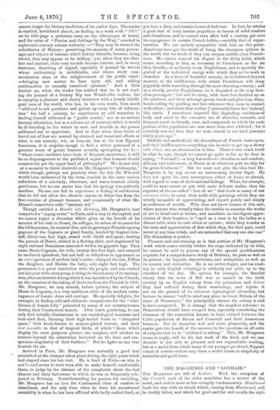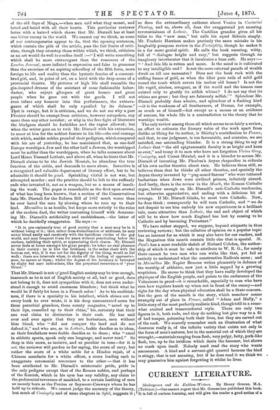THE MAGAZINES AND " LOTHAIR."
THE Magazines are full of Lothair. With the exception of the Cornhill, each of the older monthlies has a review of the novel, and each is more or leas savagely condemnatory. Blackwood leads the way with an attack which, coming from Blackwood, will be doubly bitter, and which for good and for evil recalls the style
of the old days of Maga,—when men said what they meant, and loved and hated with all their hearts. This particular reviewer hates with a hatred which shows that Mr. Disraeli has at least one bitter enemy in the world. We cannot say we think, as some of our contemporaries appear to do, that the opening sentences, which contain the pith of the article, pass the fair limits of criti- cism, though they overstep those within which, we think, criticism as an art would do well to confine itself :—" I will write something which shall be more extravagant than the romances of the London Journal, more inflated in expression and false in grammar than the exercises of an aspiring schoolboy of the fifth form, more foreign to life and reality than the hysteric fancies of a convent- bred girl, and, in point of art, on a level with the drop-scene of a provincial theatre. My pictures of high life shall resemble the gin-inspired dreams of the assistant of some fashionable haber- dasher, who enjoys glimpses of great houses and great people when he goes out with the goods. I will not even infuse any humour into this performance, the extrava- gance of which shall be only equalled by its dulness." That is savage, but it is criticism, and we do not see why a past Premier should be exempt from criticism, however outspoken, any more than any other novelist; or why in the free fight of literature the bludgeon should be forbidden and the rapier allowed ; but when the writer goes on to twit Mr. Disraeli with his extraction, to sneer at him for the noblest feature in his life—the cool courage with which, amidst nobles proud of their pedigrees, which compared with his are of yesterday, he has maintained that, as one-half Europe worships a Jew and the other half a Jewess, the worshipped must be nobler than the worshippers, when he talks nonsense about Lord Moses Tussaud Lothair, and above all, when he hints that Mr. Disraeli claims to be the Jewish Messiah, he abandons the true function of the critic, and descends to mere abuse. Invective is a recognized and valuable department of literary effort, but to be admirable it should be good. Sprinkling vitriol is not war, but attempted murder ; and the practice should be left to the ruffianly cads who invented it, not as a weapon, but as a means of insult- ing the weak. The paper is remarkable as the first open avowal of what has long been known, that a section of the Conservatives hate Mr. Disraeli for the Reform Bill of 1867 much worse than he ever hated the man by abusing whom he rose up to their lead. Macmillan is as hostile, but keeps more strictly to the rules of the modern duel, the writer contenting himself with denounc- ing Mr. Disraeli's artificiality and snobbishness,—the latter of which he decidedly exaggerates. He says :—
"It is pre-eminently true of good society that a man may be in it without being of it ; that either from disinclination or unfitness, he may never blend easily and carelessly with the fastidious circles of the gay world, and may frequent them for years without penetrating below the surface, imbibing their spirit, or appreciating their charm. Mr. Disraeli never feels at home amongst his great people : be takes no real pleasure in their society : he is like the Irishman in the sedan chair with the bottom out, who, if it was not for the dignity of the thing, would as lief walk : there are intervals when, to shake off the feeling of oppressive- ness, he sneers at them ; whilst the degree of his intimacy is betrayed by slight but sure indications, like the perpetual recurrence of your Grace.'"
That Mr. Disraeli is not of good English society may be true enough, inasmuch as he is not of English society at all, bad or good, does not belong to it, does not sympathize with it, does not even under- stand it enough to avoid enormous blunders ; but think what he would be if fairly let loose in a French salon I As to his snobbish- ness, if there is a specialty in his intellect, which shines out in every book he ever wrote, it is his deep concentrated scorn for these parochial grandees, these county magnates, " acred up to their lips, consolled up to their chins," his, certainty that their one real claim to distinction is their cash. He has said over and over again that they are barbarians, men without blue blood, who "did not conquer the land and do not defend it," and who are, as in Lothair, feeble dandies as to ideas, as their forefathers were feeble dandies as to dress ; who "excel in athletic sports, speak only one language, and never read." So deep is this scorn, so incisive, and so peculiar in tone—for it is not, the reviewer will pardon us for saying, the scorn of envy, but rather the scorn of a white noble for a Hindoo rajah, of a Chinese mandarin for a white officer, a scorn leading each to exaggerate ceremonial reverence to the other — that it has been attributed to Mr. Disraeli's aristocratic pride, pride in the only pedigree except that of the Roman nobles, and perhaps of the Koreish, which in his eyes has any validity, any claim to the preferential reverence of mankind, to a certain loathing of men so meanly born as the Percies or Seymour-Conways whom he has held up to ridicule. We cannot judge the accuracy of the theory, but much of Coningsby and of some chapters in Sybil, suggests it ; so does the extraordinary outburst about Venice in Contarini Fleming, and so, above all, does the exaggerated yet sneering reverentialnws of Lothair. The Castilian grandee gives all his titles to the "new man," but calls his equal Sidonia simply. Mr. Frederic Harrison makes precisely the same mistake in his laughably pompons review in the Fortnightly, though he makes it in a far more genial spirit. He calls the book amusing, witty, full of "dialogue bright and easy," but suggests through an. imaginary interlocutor that it inculcates a base cult. He says :— " ' And this life is rotten and mean. Is the mind in it cultivated to any intelligible end ? Is not the mere external parade of wealth dwelt on till one nauseates ? Does not the book reek with the stifling fumes of gold, as when the idiot puts rails of solid gold round the tomb which covers his useless old bones ? Is not the life vapid, aimless, arrogant, as if the world and the human race existed only to gratify its selfish whims? I do not say that its whims are gross ; but they are fatuously selfish." Splendour Mr. Disraeli probably does admire, and splendour of a flashing kind —it is the weakness of all Southerners, of Dumas, for example, as much as of himself—but except as a means or an evidence of success, his whole life is a contradiction to the theory that he- worships wealth.
The only review among them all which seems to us fairly a review, an effort to estimate the literary value of the work apart from dislike or liking for its author, is Shirley's contribution to Fraser, and that, to our judgment, is too favourable, and contains, we are satisfied, one astounding blunder. It is a strong thing to say of Lothair that "the old epigrammatic faculty is as bright and keen as ever," and to say it to men who have not forgotten Vivian Grey; Coningsby, and Count Mirabel, and it is a blunder to accuse Mr. Disraeli of inventing Mr. Phoebns's Aryan rhapsodies in ridicule of his own earlier theories about race. He believes them still, so believes them that he thinks all other theories, and specially the Aryan theory invented by "pug-nosed Saxons" who were tattooed barbarians when Jews were civilized princes, infinitely absurd. And lastly, there is the review in the Month, the Roman Catholic organ, bitter enough on Mr. Disraeli's anti-Catholic tendencies,. but otherwise appreciative, and ending with a delicious bit of revenge. If Mr. Disraeli thinks, he must turn Catholic. Now, he does think ; consequently he will turn Catholic, and "we do, not despair to see him embody his new experiences in a brilliant tale, more attractive than Lothair, the end and object of which will be to show how much England has lost by ceasing to be Catholic and by becoming Protestant."
We have rather stepped, we suppose, beyond etiquette in thus reviewing reviews ; but the collation of opinion on a popular topic has an interest for us which it may also have for our readers, and the Magazines this month contain little else that is special. St. Paul's has a most readable sketch of Richard Cobden, the author- ship of which it must be safe to attribute to W. R. G., for surely there cannot be two men who can write like that, yet fail so entirely to understand what the constructive Radicals mean ; and in Macmillan Mr. Napier Broome writes pleasantly in defence of the worship of athletics, now just a little sapped by a growing scepticism. He seems to think that they have really developed the physique of the English people, and points to the endurance of the Volunteers in proof—it is remarkable, especially to men who have seen how regulars knock up when not in front of the enemy—and sighs for the day when physical education shall be a State concern. But the gem of the month is the story, which somehow seems strangely out of place in Fraser, called "Adam and Melly," a little story of the most perfectly realistic kind, though told in a some- what excited and transcendental style. There are only two figures in it, both rude, and they do nothing but give way to a fit of bad temper, poisoning both their lives, but they are carved out of the rock. We scarcely remember such an illustration of what dourness really is, of the infinite variety that exists not only in the form of men's natures, but in the material out of which they are wrought,—materials ranging from flesh, very pulpy, fatty, pork-like flesh, too, up to the irridium which dents the hammer, but shows no mark upon itself. Nobody need read the story who wants amusement. A hind and a servant-girl quarrel because the hind is stingy, that is not amusing, but if he does read it we think we • may guarantee him against forgetting it whilst he lives.































 Previous page
Previous page